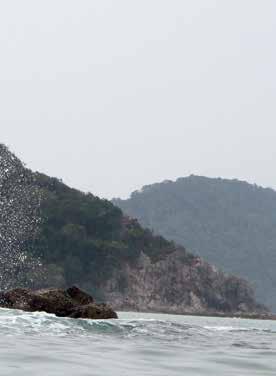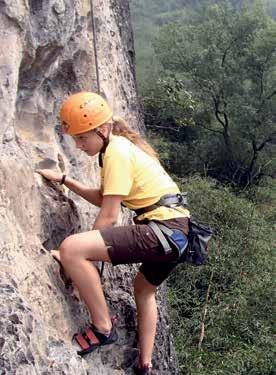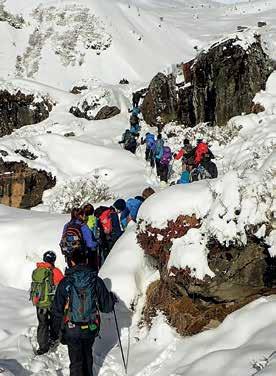
5 minute read
Outdoor education at UWCSEA across all grades at UWCSEA
Outdoor Education at UWCSEA
By Patrick Read, Head of Expeditions
How lucky we have been to be part of a school that regards outdoor education as one of its five core elements. Generations of UWCSEA students have enjoyed numerous expeditions and benefitted from the development they provide. Across our two campuses the subject continues to grow and develop. The department includes ten full time instructors who work with teachers, students and parents. The College offers almost 400 overseas trips and expeditions each academic year. This equates to 700,000 student hours overseas! Quantity is obvious, however quality of experience is always at the forefront of everyone’s mind. The College is very aware that the best trips require everyone’s input if they are to succeed. Instructors, teachers, students, parents and third party providers all work together. Our commitment has founded the first outdoor forum for South East Asian Schools (OFFSEAS), and in 2016 we received global recognition in the ISOS Duty of Care Awards. Our systems of planning prior to trips, procedures during trips and reporting after them have been copied by many other schools and organisations.
The College has committed to a seven-year study of the impact of outdoor education which Oregon State University is undertaking on our behalf, and the results that are starting to emerge are proving extremely interesting. The papers that follow will be available for all alumni to read.
From Grade 1 to Grade 11, all students have an outdoor education experience as part of their curriculum. This starts with a sleepover at school and culminates in Project Week. The latter sees students travel on their own to over 120 different locations around
Full-time instructor Nathan Frye’s insight regarding the Grade 7 Sea Kayaking expedition:
I started working with the UWCSEA Grade 7 Sea Kayaking program in 2007 on Tioman Island, Malaysia. I had taught Sea Kayaking in Alaska, California, and Belize before coming to Tioman, but I was instantly impressed with the beauty and uniqueness of the place. I was equally impressed, if not more so, with UWCSEA and its community. Over the last 10 years we’ve seen an already amazing program move forward year after year with the help of passionate leaders and educators. In those 10 years we’ve moved the program to Sibu Island, we’ve improved the quality of equipment to make it more age and skill appropriate, we’ve improved our approaches to teaching and learning in kayaking to make it more level appropriate, we’ve incorporated countless other activities into the program to alleviate activity fatigue, we’ve improved the level of training for students coming into the program to set them up for success, and we’ve curated a really stellar team of kayaking Instructors from all over the world to help our students get the most out of this experience.
Southeast Asia. Parents often report back to Outdoor Ed, describing a more resilient, determined, self-assured, calmer and positive child!
So how does this happen in such a relatively short period of time? What’s happening? Why does outdoor education have such an impact on young persons? I would suggest there are numerous reasons but I’d like to highlight some we truly believe in. The following frame the outdoor curriculum: • Through exposure to nature, individuals can develop empathy and become environmental stewards

• By recognising and regulating the self, individuals can make decisions that support health and well-being • Healthy relationships develop a sense of belonging and contribute to individual and community well-being • Individuals and groups can engage in outdoor activities by developing and applying a set of practical skills—travel, navigation, camp craft, personal and group safety, and leadership, to name a few • All the above work toward a sustainable future for us all

Grade 7 Head of Grade Jabiz Raisdana had this to add:
There is no doubt that for most schools in the world the last two decades have seen an increasing emphasis on improving academic achievement and raising standardised test and examination scores. I would suggest that this has often given rise to a narrowed curriculum where active, experiential, in-context learning has been de-emphasised or even worse, eliminated. I think we can all be proud of UWCSEA for being ‘resilient’ and holding to its belief in the value of Outdoor Education. I would like to think that Kurt Hahn would be proud of all of us. However, I am sure he would be the

first to tell us not to ‘rest on our laurels’!
From Left to Right: Coal fires in a local basti; Coal cycle wallahs carry their load of scavenged coal; Savannah feeling the heat of the ground in Jharia“Throughout the week kids learned so a group, jump off a jetty, bait a hook, a huge thank you to all the leaders many things—how to use a broom, start evacuate a campsite, clean a beach, and organizers of the Grade 7 trip to a fire, keep track of their things, do a motivate a group, motivate themselves Sibu. [My daughter] couldn’t have had full kayak roll, get up at sunrise and do … and so many things that I didn’t a more enriching experience. She left yoga, snorkel, make their own meals, notice.” excited but cautious, and she came back resolve small conflicts, put up a tent, keep themselves clean, hydrated, and safe from the elements. They learned how to roll a sleeping mat, do things the right way, roast a marshmallow, sing as The parent of one of the Grade 7 students on the expedition last year wrote the following note to the Outdoor Education team: “I just wanted to say invigorated, full of stories and more than anything, happy and proud of what the group accomplished. She is still sharing more thoughts and observations now, two weeks later. Thank you!”










